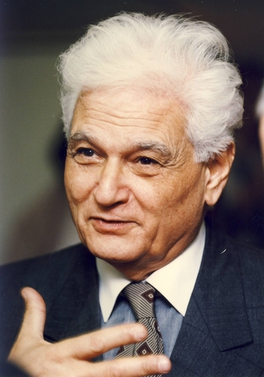Jacques Derrida
Jacques Derrida (1930–2004) was a French philosopher best known for developing a form of semiotic analysis known as deconstruction. His work is associated with post-structuralism and postmodern philosophy. Derrida's approach consisted in conducting readings of texts with an ear to what runs counter to the intended meaning or structural unity of a particular text.
Life[edit | edit source]
Jacques Derrida was born on July 15, 1930, in El Biar, a suburb of Algiers, in what was then French Algeria. His work traversed various disciplines, including philosophy, literature, and linguistics, profoundly impacting these fields. Derrida's education was marked by excellence in the study of philosophy, and he was influenced by the works of Edmund Husserl and Martin Heidegger. He moved to France for higher studies, where he was enrolled at the prestigious École Normale Supérieure in Paris.
Philosophical Work[edit | edit source]
Derrida's philosophical inquiry is primarily concerned with the nature of language, writing, and meaning. His seminal work, Of Grammatology (1967), introduces the concept of "deconstruction," a critical approach that seeks to uncover layers of meaning in texts that are hidden by traditional interpretations. Derrida argued that language is inherently unstable and that meaning is always deferred, a concept he termed différance. This idea challenges the possibility of absolute interpretation or fixed meaning in texts, suggesting instead that meaning is always in flux.
Derrida's critique extended beyond literary texts to philosophical discourses and structures. In Writing and Difference (1967) and Speech and Phenomena (1967), he explores the relationship between speech and writing, arguing against the logocentrism—the privileging of speech over writing—that he saw as pervasive in Western thought.
Impact and Criticism[edit | edit source]
Derrida's work has had a profound impact on a wide range of disciplines, including literature, law, anthropology, and political science, among others. His ideas have been instrumental in the development of critical theory, feminist theory, and queer theory, challenging traditional notions of identity, textuality, and the boundaries between disciplines.
However, Derrida's work has also been subject to criticism. Some critics argue that his dense and complex style is deliberately obfuscatory, while others contend that deconstruction is nihilistic or that it undermines the possibility of objective knowledge or truth.
Legacy[edit | edit source]
Despite the controversies surrounding his work, Derrida remains one of the most influential figures in contemporary philosophy. His concepts of deconstruction and différance continue to be debated and applied in various fields, demonstrating the enduring relevance of his thought. Derrida's legacy is also preserved through his extensive body of work, which includes more than 40 books and numerous essays and lectures.
Selected Works[edit | edit source]
- Of Grammatology (1967)
- Writing and Difference (1967)
- Speech and Phenomena (1967)
- Margins of Philosophy (1972)
- The Post Card: From Socrates to Freud and Beyond (1980)
See Also[edit | edit source]
Navigation: Wellness - Encyclopedia - Health topics - Disease Index - Drugs - World Directory - Gray's Anatomy - Keto diet - Recipes
Search WikiMD
Ad.Tired of being Overweight? Try W8MD's physician weight loss program.
Semaglutide (Ozempic / Wegovy and Tirzepatide (Mounjaro) available.
Advertise on WikiMD
WikiMD is not a substitute for professional medical advice. See full disclaimer.
Credits:Most images are courtesy of Wikimedia commons, and templates Wikipedia, licensed under CC BY SA or similar.
Contributors: Prab R. Tumpati, MD

